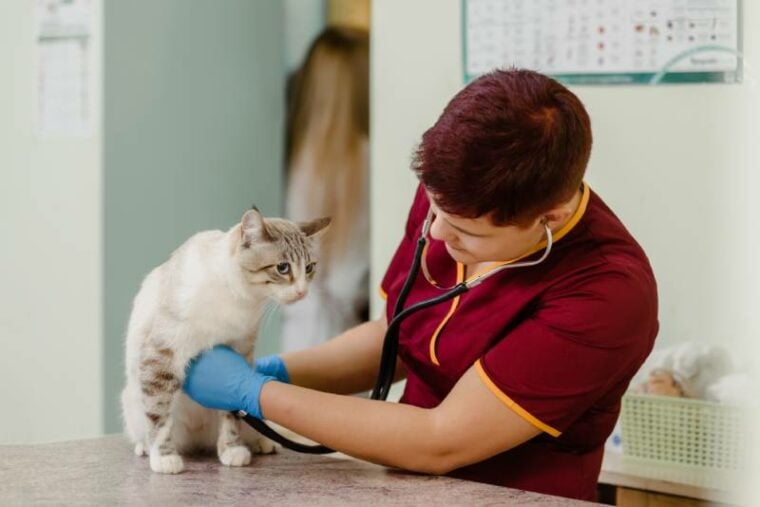
Click to Skip Ahead
Cats should be taken to the emergency veterinarian when they’re in acute distress. They need to be seen immediately if they’re having trouble breathing, have lost consciousness, have become paralyzed, or are experiencing repeated seizures. Other situations that merit immediate medical intervention include poison or foreign body ingestion, heatstroke, abdominal pain, and bouts of intense and frequent vomiting.
Cats who’ve been seriously injured in an accident or fight and those who can’t produce urine should also head to the emergency veterinarian. Trauma, heart failure, heatstroke, and serious allergic reactions can all cause shock. Signs of shock include severe lethargy, fast heart rate, pale mucous membranes, cold ears, and vomiting. Shock is a serious and potentially fatal emergency requiring immediate medical treatment.
Common Signs of Concern
It can sometimes be difficult to determine whether a cat’s signs are serious enough to warrant a trip to the emergency veterinarian. Below we’ll discuss some of the most common concerning signs indicating a cat needs immediate help.
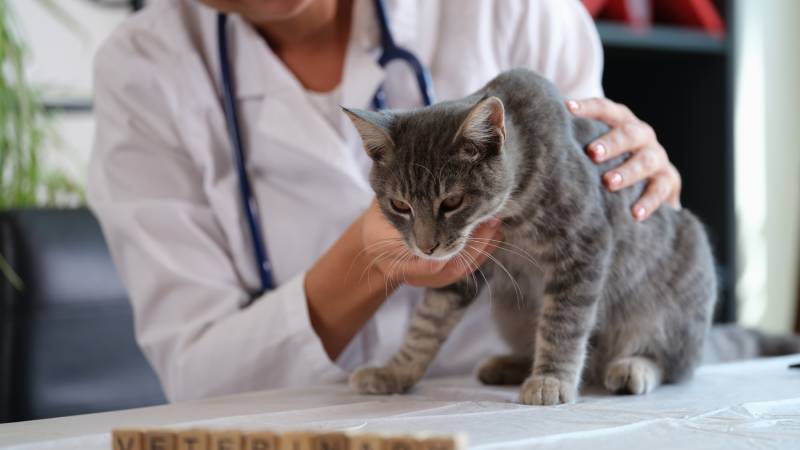
Breathing Difficulties
A veterinarian should immediately evaluate cats if they have difficulty getting enough air. Signs that cats are having trouble breathing include blue or dark gums, panting, open-mouth breathing, taking rapid breaths, and labored abdominal breathing.
Cats can have trouble breathing because of infections, allergies, or even heart disease. Severe allergic reactions to insect bites and vaccines can also cause breathing problems, though this is rare. Cats suffering from allergy-related anaphylactic shock often experience gastrointestinal difficulties and can develop hives.
Intense or Repeated Vomiting & Diarrhea
While it’s not “normal” for kitties to have stomach problems, there’s no reason to rush off to the emergency veterinarian whenever cats cough up a hairball or eat something that doesn’t agree with them. But it’s time to head to the emergency hospital when cats vomit over and over in a short period of time, or it keeps going for more than 6 to 12 hours. Extremely sick cats can quickly end up dehydrated, and intense vomiting is often a sign of a toxin or foreign body ingestion, both of which require immediate treatment.
Chronic vomiting often has a more systemic cause and should be looked into by your veterinarian. Contact your veterinarian for guidance if your cat throws up more than once a week, particularly if it becomes a regular occurrence.
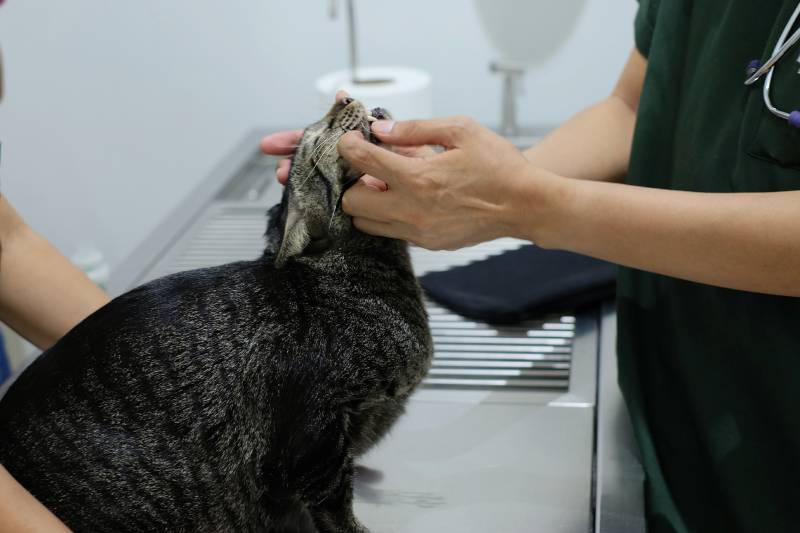
Seizures
Electrical disturbances in the brain cause seizures, which result in shaking, tremors, and a loss of consciousness. Feline seizures can be caused by a disease such as epilepsy, tumors, or trauma. Any seizure lasting more than 2 or 3 minutes and multiple short seizures in quick succession should be considered medical emergencies. If your cat has a seizure but recovers, reach out to your veterinarian right away for guidance, as these events can indicate conditions such as kidney and liver disease.
Common Events That Result in Trips to the Veterinarian
While emergencies can occur anywhere and at any time, a few situations commonly cause trips to the veterinarian.
Accidents, Fights, & Trauma
Anytime a cat has been in a fight with another animal, fallen from a serious height, or been involved in an accident with a car, they should be taken to the veterinarian. Unconscious or bleeding cats and those with broken limbs require immediate attention and should be taken to the nearest veterinary emergency facility.
But pets who appear only to have minor injuries should also be checked out, as cats typically hide pain, so it can be easy to miss signs of serious injury. Treating injuries promptly reduces your cat’s pain and is often the best way to prevent the development of serious complications.
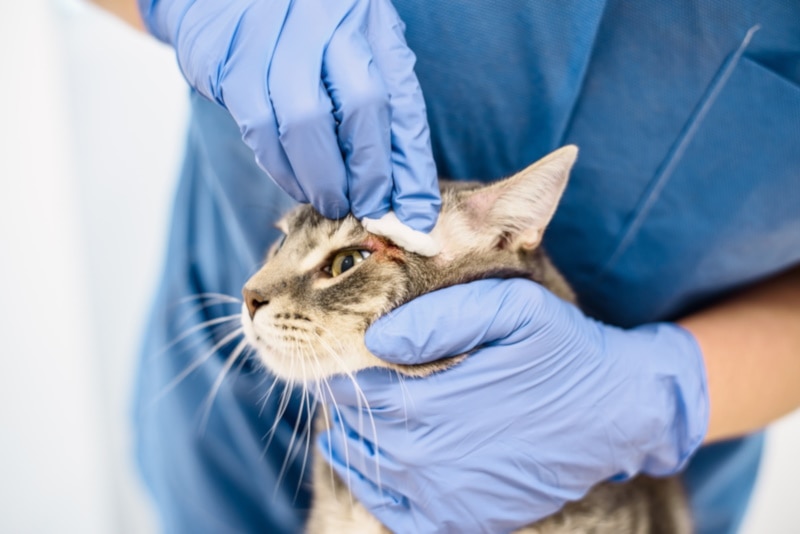
Foreign Body Ingestion
When cats ingest strange things, one of two things can happen; they either poop the item out or not. But it can be difficult to tell ahead of time whether the object will pass through the digestive system or become stuck and lead to complications, such as obstructions. While cats sometimes swallow objects like buttons, the biggest offenders are yarn, tinsel, and rubber bands that kitties generally like to play with.
When linear objects become stuck in cats’ intestines, they can cause infections or damage the intestines. Signs of foreign body ingestion often include lack of appetite, vomiting, lethargy, diarrhea, and abdominal pain.
Toxin Ingestion
From plants to essential oils, there are many ways for cats to get themselves into trouble around the house regarding toxic substances. Plants such as lilies and Sago palms are particularly toxic to cats. Kitties that snack on intensely poisonous plants should be immediately taken to the nearest animal hospital.
Other extremely potent toxins include household products such as bleach, insecticides, and antifreeze. If your pet has something toxic on their paws or fur, wash it off immediately with lots of water, then contact your veterinarian for guidance. Reach out for help if you suspect your cat has consumed or been exposed to these products.
Foods such as garlic, onions, chocolate, and raisins can also cause be deadly to cats. Allium family members, such as onions and shallots, are hazardous for cats to consume. But the amount required to reach toxic levels depends on several factors, including whether the onion or garlic was fresh or dried and how much was consumed. If your cat eats something toxic, call your veterinarian and explain the situation. Depending on your cat’ signs, overall health, and what they got into, your veterinarian may advise you to keep an eye on your pet or to bring them in for a visit.
Urinary Blockages
Complete urinary blockages are considered medical emergencies. They occur when a blockage develops in a cat’s urethra and prevents them from urinating. It’s often caused by bladder stones, inflammatory conditions, and even mucous and crystal plugs. It’s more commonly seen in male than female cats.
Blockages that aren’t promptly treated can result in heart problems, kidney failure, bladder rupture, and even death. Early indications that a cat may have trouble urinating often include frequent trips to the litter box without producing much urine, genital licking, and lethargy. But when cats don’t pee for 12 to 24 hours, it becomes an absolute medical emergency.
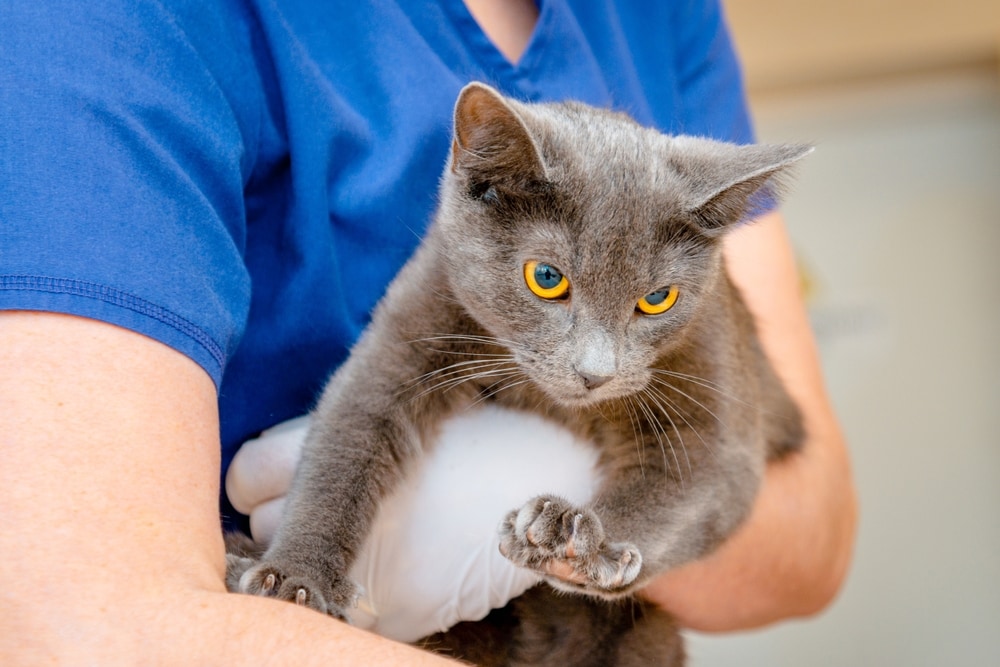
Heatstroke
Cats have trouble cooling down efficiently when they’re exposed to high temperatures for too long, and they rely on panting and a few sweat glands to cool themselves. Cats can have heatstroke if they stay outside without sufficient shade on hot days or when left in carriers or cars.
Signs of heat exhaustion include vomiting, lethargy, and coordination problems. Many cats also have rapid pulse rates and high body temperatures. Heatstroke can be a medical emergency, depending on the severity of the signs. Cats who are unconscious or showing signs of heat stroke must be seen immediately and require first aid. Your veterinarian can walk you through the steps to keep your cat safe while you’re on the way to the hospital.
The 5 Steps to Take in an Emergency
Staying calm is the most important thing to do in any emergency. Take a few deep breaths, evaluate the situation, and act.
1. Determine What Happened
Spend a few minutes trying to get a basic idea of what happened, so you can take the required steps to protect them further.
2. Contact Your Veterinarian
Call your veterinarian even if you’re unsure that your cat needs to be seen urgently. Explain the situation as calmly as possible so they can evaluate whether your cat has any immediate first aid needs and give you information to help you keep your cat safe.
3. Give Your Cat First Aid if Needed
Follow your veterinarian’s first-aid instructions to ensure your cat gets the care and support they need until they can be helped at the hospital.
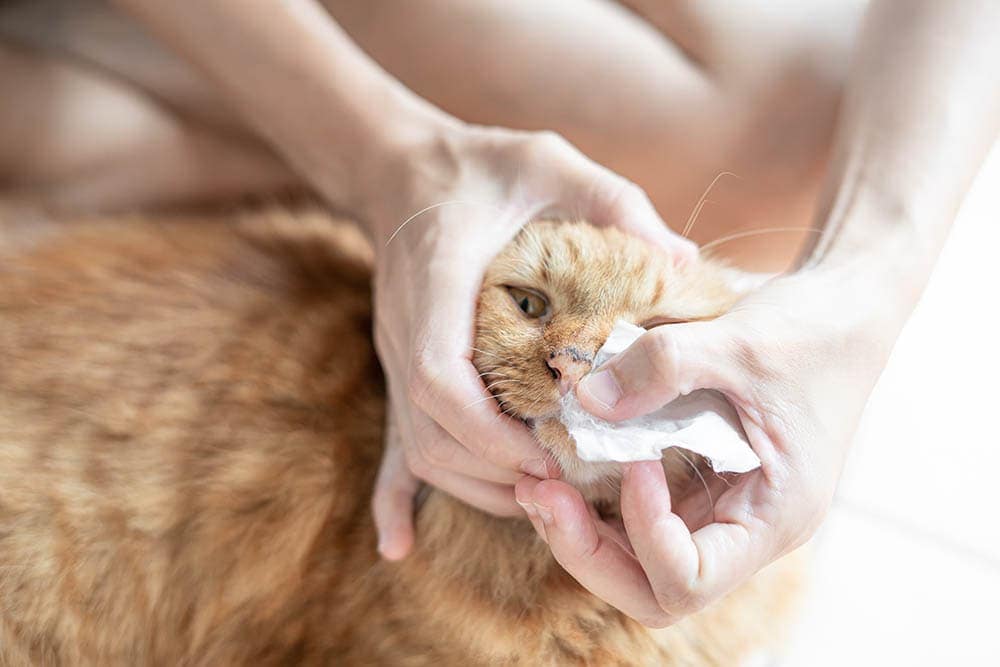
4. Be Sensitive to Your Cat’s Needs
Cats who have been in fights or injured in a motor vehicle accident are often in severe pain and may react aggressively when approached. Wrapping frightened cats in towels often makes them feel safe enough to calm down. But speak with your veterinarian before attempting to hold or even move a cat with a spinal injury or broken bones.
5. Pick the Best Carrying Option
The most crucial task in any emergency is promptly getting your cat the help they need without making things worse along the way. Depending on the injury, using a sturdy box may be better than struggling to get your cat into a carrier. You can speak with your veterinarian and follow their advice regarding the safest way to transport your cat.
Conclusion
Cats should be taken to the emergency veterinarian when they’re having trouble breathing, are in severe pain, have been injured in a fight or accident, or are unconscious. Immediate medical attention is also called for when kitties have seizures, trouble walking, or difficulty urinating. In an emergency, ensure your pet is safe and contact your veterinarian for guidance. Explain the situation and follow your veterinarian’s advice regarding how to care for your pet until they’re examined.
Featured Image Credit: Denys Kurbatov, Shutterstock







